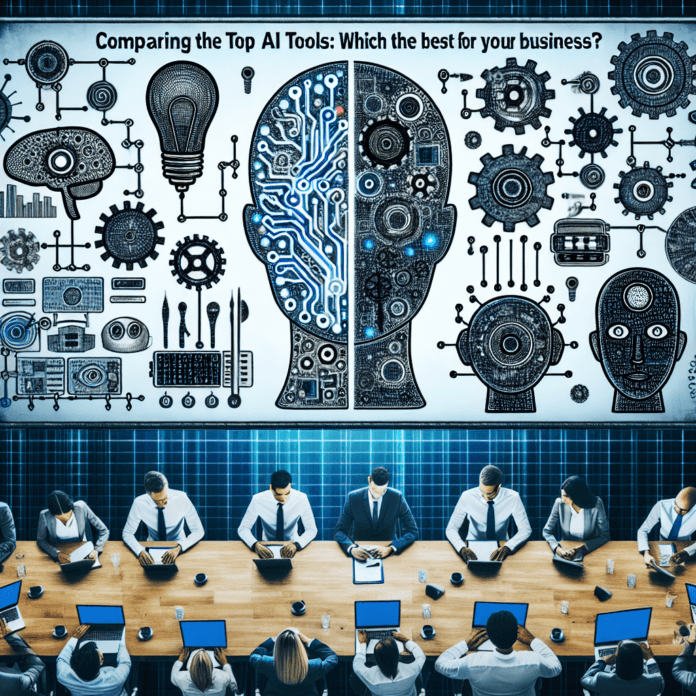Introduction
Artificial Intelligence (AI) has become an integral part of modern businesses, revolutionizing the way companies operate and interact with their customers. With a multitude of AI tools available in the market, it can be overwhelming to choose the best one for your business. In this blog post, we will compare the top AI tools and help you determine which is the best fit for your specific business needs.
Understanding AI Tools
Machine Learning
Machine learning is a subset of AI that enables systems to learn and improve from experience without being explicitly programmed. This technology is used in various applications such as predictive analytics, fraud detection, and customer relationship management.
Natural Language Processing
Natural Language Processing (NLP) allows machines to understand and interpret human language, enabling chatbots, sentiment analysis, and language translation.
Computer Vision
Computer vision is the ability of machines to interpret and understand the visual world, enabling applications like facial recognition, object detection, and autonomous vehicles.
Robotics
Robotics combines AI with physical machines to perform tasks in the physical world, such as manufacturing, healthcare, and logistics.
Comparing the Top AI Tools
IBM Watson
IBM Watson is a powerful AI platform that offers a wide range of capabilities, including natural language processing, machine learning, and data analytics. It is suitable for large enterprises with complex AI needs.
Google Cloud AI
Google Cloud AI provides a suite of AI tools and services, including machine learning, data analytics, and speech recognition. It is known for its scalability and integration with other Google Cloud services.
Amazon AI
Amazon AI offers a variety of AI services, such as image and video analysis, natural language processing, and personalized recommendations. It is popular among businesses using Amazon Web Services (AWS).
Microsoft Azure AI
Microsoft Azure AI provides a comprehensive set of AI tools, including machine learning, computer vision, and speech recognition. It is known for its seamless integration with Microsoft’s other business solutions.
Choosing the Best AI Tool for Your Business
Assess Your Business Needs
Before selecting an AI tool, it’s crucial to understand your business requirements and the specific problems you want to solve with AI.
Consider Scalability and Integration
Ensure that the AI tool you choose can scale with your business growth and seamlessly integrate with your existing systems and processes.
Evaluate Cost and ROI
Compare the costs and potential return on investment of each AI tool to make an informed decision that aligns with your budget and business goals.
Seek User Feedback and Reviews
Research user experiences and reviews of the AI tools to gain insights into their usability, performance, and customer support.
Real-Life Examples of AI Implementation
Many businesses have successfully implemented AI tools to streamline operations, improve customer experiences, and drive innovation. For example:
- Netflix uses machine learning to recommend personalized content to its users based on their viewing history.
- Uber employs natural language processing to enhance its customer support through chatbots and voice recognition.
- Mercedes-Benz utilizes computer vision for quality control in its manufacturing processes, detecting defects in vehicles with high accuracy.
Conclusion
Choosing the best AI tool for your business requires careful consideration of your specific needs, scalability, cost, and user feedback. By comparing the top AI tools and understanding their capabilities, you can make an informed decision that drives business growth and innovation.
FAQs
Q: How can AI tools benefit small businesses?
A: AI tools can help small businesses automate repetitive tasks, gain valuable insights from data, and provide personalized customer experiences.
Q: Are there free AI tools available for businesses?
A: Yes, some AI tools offer free versions or trial periods for businesses to explore their capabilities before making a financial commitment.
Q: What are the potential challenges of implementing AI tools in a business?
A: Challenges may include data privacy concerns, integration with existing systems, and the need for specialized talent to manage and optimize AI tools.
Q: Can AI tools replace human workers in a business?
A: While AI can automate certain tasks, it is more commonly used to augment human capabilities and improve overall efficiency and productivity.
Q: How can businesses stay updated with the latest advancements in AI tools?
A: Businesses can stay informed about AI advancements through industry conferences, online resources, and networking with AI experts and professionals.









